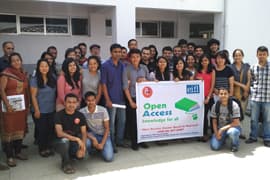Open Access Nepal

“If I have seen further, it is by standing on the shoulders of giants.” - Isaac Newton
Most educational institutions and state libraries rely on academic and scientific journals for research or teaching to expand the pool of knowledge. But each yearthe prices of journals are increasing at an exponential rate, which effectively locks out access to the repository of information. To promote a free-to-use and free-of-charge content, Open Access Nepal (OAN) organized a one-day workshop called “Greater Reach for Research” on 5 September 2015 at Kathmandu College of Management (KCM). Dr Roshan Karn, President of OAN, explained that a free, online access to scholarly literature is based on 3 pillars: Open Access Publishing, Open Access Support and Open Access Archiving.
On a similar note, Ms. Teresa Hackett, Programme Manager of Electronic Information for Libraries, stated that one of the barriers to open content is the restrictive copyright law. Copyright is the provision of legal protection granted to the creators of intellectual works and its original purpose was to encourage creativity and learning. However the current copyright system is broken and requiresmassive reform to protect the exclusive rights of creators but, at the same time, encourage innovation through access to copyrighted works. According to Ms. Hackett, the Nepal Copyright Act is also under review.
Mr. Madhu Sudan Gautam, Senior Faculty and Research Director at KCM,discussedin detail about the Impact of Open Access Policy and Practices. His investigation showed that open-access journals accounted for only 2.5 percent of the total literature. Though the Internet is threatening the conventional pay-for-access model of publishing, more needs to be done for the complete dissemination of information for the good of the public. Finally the workshop concluded with group presentations by the participants on the major issuesofan open access policy.
Isaac Newton understood that the discovery of gravity was built upon the findings of many other great scientists and that knowledge should be shared so that humanity, as a whole, can benefit. And the Open Access movement is hoping to accomplish that by creating a world of knowledge without borders.

